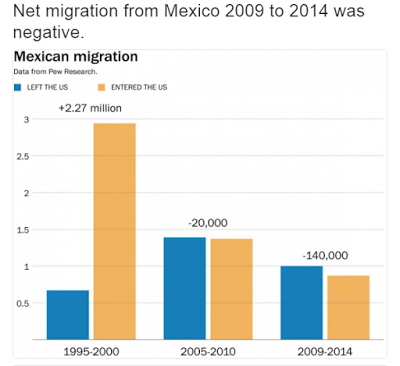Less of a Problem than You May Have Heard

Please note that we are not authorised to provide any investment advice. The content on this page is for information purposes only.
There has been much discussion in the US presidential campaign about immigration, especially from Mexico. Trump has proposed a wall for the 2000-mile border. Different types of fences are on about a third of the border as it stands today.
However, as this Great Graphic, from Pew Research shows, Mexican immigrants may have been a problem previously, but for the past decade (2005-2014) more Mexicans have left the US than entered (hat tip to Philip Bump).
There has been much discussion in the US presidential campaign about immigration, especially from Mexico. Trump has proposed a wall for the 2000-mile border. Different types of fences are on about a third of the border as it stands today.
However, as this Great Graphic, from Pew Research shows, Mexican immigrants may have been a problem previously, but for the past decade (2005-2014) more Mexicans have left the US than entered (hat tip to Philip Bump).
In 1995-2000, a little more than two and a quarter million Mexicans migrated to the US. In the 2005-2014 period, 160k net have returned to Mexico.
What happened in the second half of the 1990s? One word: NAFTA. The apparent immigration problem may have really been a function of US trade policy. Recall that under NAFTA, Mexico had to remove much of their supports and subsidies for agricultural products. This was particularly hard on Mexico’s corn growers. In turn, it appears that many Mexican’s that came to the US in the second half of the 1990s came from the corn growing region.
At the same time, it is true that some of the traffic on the US-Mexican border is not from Mexico, but from other countries in Central America. These include El Salvador, Guatemala, and Honduras. However, these are small countries and the numbers are small. In 2014, the last year of complete data, the largest number of migrants are from (gross flow not net) India (147.5k) and China (132k).
Not be confused with the facts on immigration, a number of market participants continue to see the US presidential election as a factor that is influencing the vagaries of the Mexican peso. The recent slide in the peso (the US dollar has risen from ~MXN18.26 in the middle of last week to MXN19.20) has coincided with the pullback in oil prices, higher yields, and a little firmer Trump poll numbers. Nate Silver’s Fivethirtyeight.com indicates that based on current polls, the odds of Clinton becoming the next US President is about 69%. A month ago, it was around 88%. The US dollar appears to be finding support around the previous resistance at MXN19.00.
Great Graphic: Net Mexican Migration to the US–Not What You Might Think is republished with permission from Marc to Market





